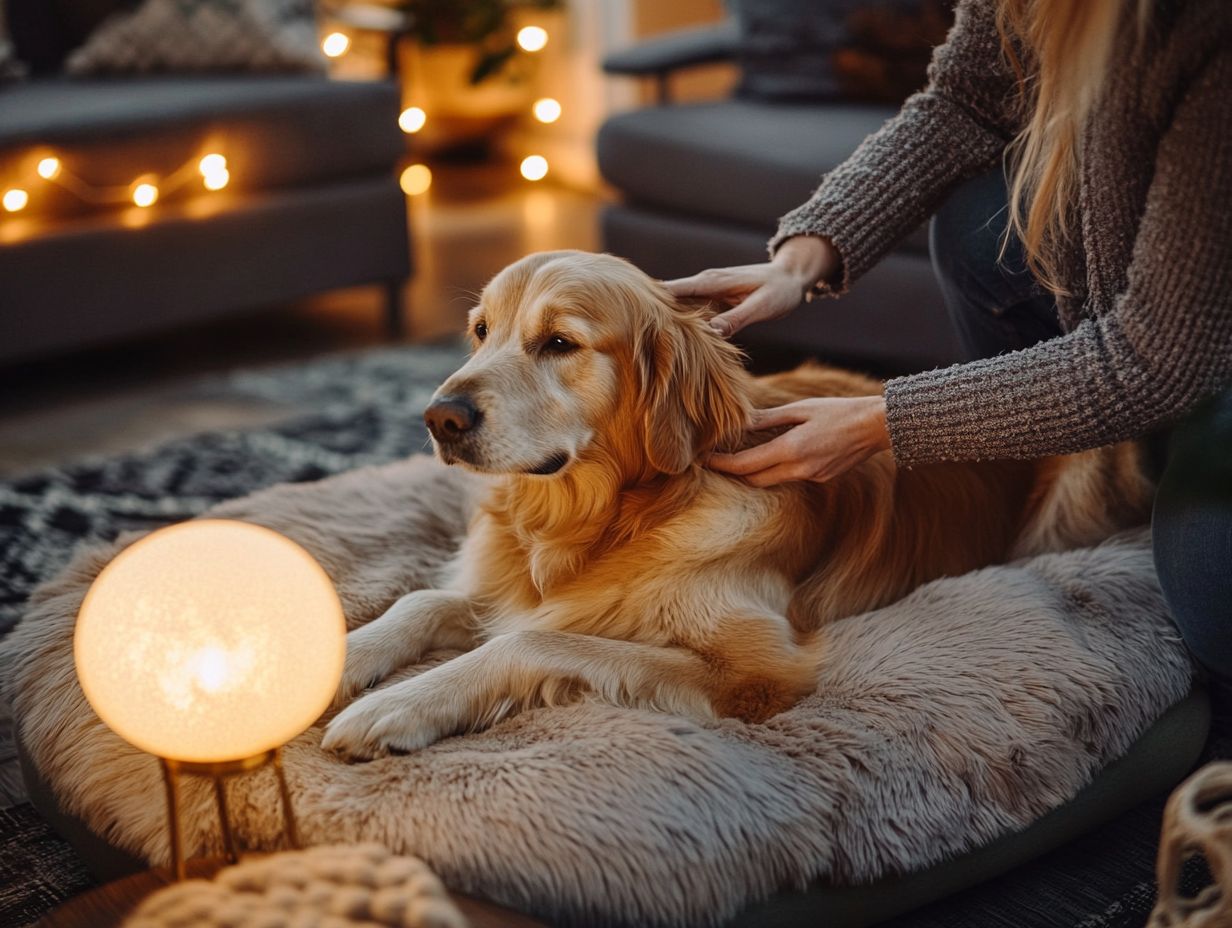What Are Helpful Tips for Reducing Pet Anxiety?
Pet anxiety is a prevalent concern that affects many of your furry companions, often resulting in distressing behaviors and health issues.
Understanding the underlying causes and symptoms of this condition is essential for you as a pet owner. This article delves into the impact of anxiety on your pet’s behavior and overall well-being.
You’ll uncover effective strategies for creating a calming environment. These include behavior modification techniques and alternative remedies like herbal supplements and CBD.
Let s dive in to discover how you can brighten your pet s life today! Moreover, we ll explore the right moments to seek professional assistance.
Contents
Key Takeaways:

- Creating a calm environment can help reduce pet anxiety. This includes providing a safe and comfortable space, playing soothing music, and establishing a routine.
- Training methods to help your dog, such as positive reinforcement and desensitization, can manage and reduce pet anxiety. Consistency and patience are key in implementing these techniques.
- Alternative remedies, like herbal supplements and CBD, can be effective in reducing pet anxiety. However, it’s important to consult with a veterinarian before trying any new supplements or treatments for your pet.
Understanding Pet Anxiety
Understanding pet anxiety is essential for you as a dog owner, as it profoundly impacts your dog’s overall well-being and emotional health. If you notice signs of distress, knowing what to do if your pet’s anxiety worsens can help you address various factors that contribute to this issue, which often manifest through noticeable behavioral changes and emotional responses.
By recognizing the early signs of anxiety, you can prevent further complications in your dog s mental state. It’s important to address common questions about dog anxiety to improve communication with your veterinarian or canine behaviorist. This enables you to provide the best possible care for your furry companion in a nurturing and calm environment.
Causes and Symptoms
Understanding the causes and symptoms of pet anxiety is crucial for effectively managing your dog s emotional well-being. Various factors can trigger anxiety in dogs, leading to distressing behaviors that can disrupt both your lives. Common fears, such as loud noises, new environments, or separation from you, can result in significant anxiety symptoms.
By employing training methods to help your dog and seeking expert advice, you can provide the support your dog needs to navigate these challenges. Recognizing signs like excessive barking, pacing, or destructive behavior can help you identify when your dog is struggling with anxiety.
Specific triggers, such as thunderstorms or unfamiliar social situations, often exacerbate these feelings. One of the most prevalent types of anxiety is separation anxiety, which typically manifests when your dog is left alone.
Integrating natural therapies, such as calming herbs or soothing music, can also be instrumental in managing your dog’s anxiety. If you’re wondering what to do if your pet gets anxious in public, collaborating with a professional can yield personalized strategies tailored to your dog’s unique situation, ensuring a more peaceful and balanced life for both you and your beloved pet.
Effects of Pet Anxiety

The effects of pet anxiety on dogs can be quite profound, influencing their behavior, health, and overall emotional well-being. Untreated anxiety can lead to destructive behavior, heightened aggression, or even health issues like gastrointestinal problems.
By implementing effective dog training and calming techniques, you can significantly mitigate these effects, ensuring that your dog remains a happy and well-adjusted member of your family.
Start creating a calming space for your pet today!
Impact on Behavior and Health
The impact of anxiety on your dog’s behavior and health can show up in many ways. You might notice your anxious dog barking excessively, showing destructive tendencies, or withdrawing from their surroundings.
Behavior shifts are not just a nuisance. They can lead to serious health issues, so it s essential to monitor symptoms and consult a vet or behaviorist for effective training and intervention, especially for anxious dogs.
For example, an anxious dog may develop compulsive behaviors like pacing or chewing on furniture, which can damage your belongings and potentially cause injuries. Chronic anxiety might also trigger gastrointestinal issues such as vomiting or diarrhea due to stress. As your dog’s discomfort grows, they may become more aggressive or fearful, isolating themselves and worsening their mental state.
Act now! Keeping a close eye on these symptoms can make a world of difference for your dog s health. Seeking professional guidance from sources like the AKC GoodDog Helpline in behavioral training is essential. This allows you and your pet to enjoy a healthier, happier life together.
Ways to Reduce Pet Anxiety
Reducing pet anxiety is possible using various strategies that create a tranquil environment and foster positive experiences for your dog. For more detailed insights, check out best practices for pet owners and anxiety. Establishing a consistent routine and engaging in calming games can help your dog feel more secure and at ease.
Using desensitization counterconditioning techniques helps you address anxiety triggers in a controlled setting, ultimately promoting greater emotional stability for your furry friend.
Creating a Calming Environment

Creating a calming environment for your dog is essential to alleviate anxiety. This ensures they have a safe haven to retreat to when the world feels overwhelming. For more insights, check out what you should know about therapy for anxious pets.
In this nurturing space, incorporate tools that promote tranquility and security. For instance, Thundershirts or calming coats can provide gentle, reassuring pressure that many dogs find comforting during stressful situations like thunderstorms or loud noises. The Adaptil diffuser releases soothing pheromones that can ease nerves and promote a sense of well-being.
Establishing a zen crate, complete with soft bedding and familiar toys, creates the perfect retreat for your dog, allowing them to recharge away from distractions. All of these elements significantly enhance your dog’s emotional stability and comfort.
Behavior Modification Techniques
Implementing behavior modification techniques, such as desensitization and counterconditioning, is crucial for addressing your dog’s anxiety effectively. To learn more about this, check out key factors in understanding pet anxiety. Gradually exposing your dog to their anxiety triggers while using positive reinforcement can help build their confidence and reduce emotional stress.
Consulting a canine behaviorist or trainer provides expert advice tailored to your dog’s specific needs, making the process more effective.
This approach pairs anxiety-inducing stimuli with positive experiences like treats or play, allowing your pet to associate those triggers with something enjoyable. Remember, patience is key; rushing this process can increase stress for your dog.
By incorporating consistent training techniques, you not only reinforce positive behaviors but also create a structured environment that can further alleviate anxiety.
Seeking professional guidance ensures these methods are applied correctly, enhancing your dog’s progress and helping you understand their emotional landscape.
Alternative Remedies for Pet Anxiety
Exploring alternative remedies for your dog s anxiety can provide valuable support and foster a more balanced emotional state. Natural supplements like CBD oil and Bach flower remedies have gained popularity for their soothing effects.
Incorporating music therapy and engaging in calming games can significantly enhance your dog s relaxation and alleviate stress.
Try these remedies today to help your dog find peace and happiness!
Herbal Supplements and CBD

Herbal supplements and CBD oil have become popular options for managing anxiety disorders in dogs. Brands like Innovet provide natural ways to soothe anxious pups. These remedies not only support your dog s emotional balance but also help alleviate anxiety symptoms, making them a favored choice among pet owners who seek holistic solutions.
The calming effects of these natural alternatives arise from their ability to interact with a system in your dog s body that helps manage mood and stress. Informed pet owners recognize that herbal supplements can deliver additional nutrients and compounds promoting relaxation without the unwanted side effects often seen with pharmaceutical medications.
Make sure to research thoroughly on reputable products and consult with a veterinarian to ensure your pet s specific needs are met. This approach not only enhances the effectiveness of the treatment but also guarantees your furry companion s safety and well-being, paving the way for a more serene and joyful life together.
Seeking Professional Help
When dealing with severe pet anxiety, seeking professional help is not just advisable; it’s essential. Veterinarians and animal behaviorists have the knowledge needed to address your dog’s unique needs. They can identify the underlying issues contributing to anxiety symptoms and suggest custom training or treatments, including the best toys for anxious pets.
Don’t wait too long your dog’s well-being is important! Engaging with these professionals ensures that your dog receives the specialized support necessary for them to truly thrive.
When to Consult a Veterinarian or Animal Behaviorist
Knowing when to consult a veterinarian or animal behaviorist is key for effectively addressing your dog’s anxiety, especially when symptoms escalate or begin to impact their quality of life. If your dog struggles with anxiety even after training, it s time to seek help.
Regularly monitoring your dog’s symptoms is crucial in identifying any changes that may signal a need for professional intervention. For example, if your furry friend starts showing signs of destructive behavior, excessive barking, or withdrawal from social interactions, these could indicate an underlying issue that requires attention.
If your training techniques aren t yielding results, it might be time to reconsider your approach and consult a skilled professional who truly understands the nuances of canine behavior. Remember, early intervention is crucial to enhancing your dog’s overall well-being.
Frequently Asked Questions
What are helpful tips for reducing pet anxiety?
1. Keep a consistent schedule: Pets thrive on routine. Keeping their daily schedule consistent will help them feel secure and reduce anxiety. For more insights, check out best practices for pet anxiety training.
2. Provide plenty of exercise: Physical activity is crucial for your pet’s well-being. Make sure to provide plenty of playtime and walks.
Incorporating fun activities like dog sports can also build your dog’s confidence.
3. Create a safe space: Designate a specific area in your home for your pet to feel safe. This could be a cozy crate, bed, or quiet room.
4. Try calming aids: Many natural and easy-to-find supplements can help calm anxious pets. If you’re unsure, check out what to do if your pet is anxious after moving and talk to your veterinarian about the best options.
5. Use positive reinforcement: Rewarding with treats and praise can effectively reduce anxiety. For more tips, check out best practices for traveling with anxious pets. This approach also strengthens your bond with your pet.
6. Seek professional help: If your pet’s anxiety is severe, consider consulting a professional behaviorist. Organizations like the GoodDog Helpline can help you create a plan tailored to your pet’s needs, and they can also provide insights on what natural remedies can help with pet anxiety.
They might suggest techniques like calming games and proper nutrition to support your pet’s mental health.
Try these tips today and see how they improve your pet’s happiness!






